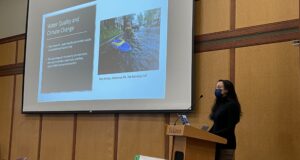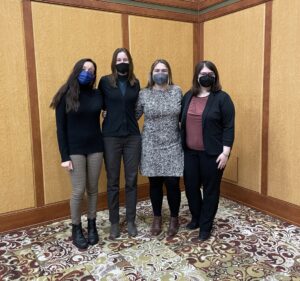On March 29th, ALLARM kicked off the 2022 Climate Justice Teach-In, hosted by Dickinson College, with a session on Climate Change, Water Quality, and Community-Centered Solutions. Our presenters included student watershed coordinators Claudia Bonaccorsi (‘22) and Charlotte Kratovil-Lavelle (‘24), as well as senior staff members Stephanie Letourneau (Community Science Specialist) and Phoebe Galione (Outreach Manager).
Claudia kicked off the presentation with a discussion on the impacts of climate change on the water quality of local waterways. She noted that it was her first-time presenting about climate change outside of her coursework as an environmental studies major. Reflecting on her experience at the Climate Justice Teach-In, Claudia voiced that, “The audience was engaged, and [she] was pleasantly surprised to see a robust audience of dozens of students, professors, and community members on an early Wednesday morning. The Q&A was particularly exciting due to some wonderful comments and supportive feedback from audience members.”
Following Claudia, Charlotte discussed the importance of community science in tackling the environmental challenges we face. Scientific literacy, environmental stewardship, sense of place and community, and civic engagement were some of the key themes she emphasized. “It was very satisfying to read about something that hit so close to home for me. Where I live, there is a real sense of community, and that contributes to the way people think about their relationships with their environment and with others. Being able to connect with the ideas I was learning about made me that much more eager to share them with others.”
Stephanie Letourneau presented next, walking the audience through the Chesapeake Monitoring Cooperative and how ALLARM works with other organizations within the Chesapeake Bay watershed to monitor water quality. Stephanie echoed enthusiasm for the presentation and the audience’s energy: “As a presenter, I enjoy being able to interact with the audience and it was a rewarding opportunity to be able to share our work with our campus and Cumberland County community. The audience’s questions were well thought out and provided opportunities for the entire team to engage in meaningful dialogue with the community.”
Phoebe Galione wrapped up the presentation with a discussion on finding indicators of climate change in data and the importance of data visualization. She highlighted several case studies, found in ALLARM volunteers’ data, that allowed the attendees to see trends in warming waters as well as to look at pictures of streams to assess vulnerability. She noted how “after the presentation, attendees asked questions related to waterways by their own residences, and what resources were available to ensure that they were doing all that they could to mitigate climate change on their own properties. It’s great to see people spurred into action under what could be seen as daunting circumstances!”
Overall, the experience was rewarding for all members of the Teach-In Team to be able to showcase the final product of hours of research and preparation. At a time when climate change can often feel overwhelming, it is important to bring these issues close to home and reaffirm that we have the power to take action, catalyze change, and promote a more just community.

